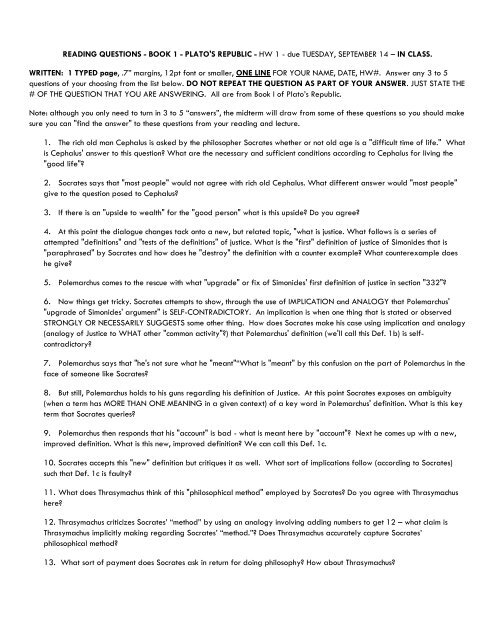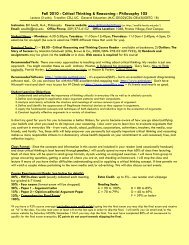READING QUESTIONS - BOOK 1 - PLATO'S REPUBLIC - HW 1 ...
READING QUESTIONS - BOOK 1 - PLATO'S REPUBLIC - HW 1 ...
READING QUESTIONS - BOOK 1 - PLATO'S REPUBLIC - HW 1 ...
You also want an ePaper? Increase the reach of your titles
YUMPU automatically turns print PDFs into web optimized ePapers that Google loves.
<strong>READING</strong> <strong>QUESTIONS</strong> - <strong>BOOK</strong> 1 - <strong>PLATO'S</strong> <strong>REPUBLIC</strong> - <strong>HW</strong> 1 - due TUESDAY, SEPTEMBER 14 – IN CLASS.<br />
WRITTEN: 1 TYPED page, .7” margins, 12pt font or smaller, ONE LINE FOR YOUR NAME, DATE, <strong>HW</strong>#. Answer any 3 to 5<br />
questions of your choosing from the list below. DO NOT REPEAT THE QUESTION AS PART OF YOUR ANSWER. JUST STATE THE<br />
# OF THE QUESTION THAT YOU ARE ANSWERING. All are from Book I of Plato’s Republic.<br />
Note: although you only need to turn in 3 to 5 “answers”, the midterm will draw from some of these questions so you should make<br />
sure you can "find the answer" to these questions from your reading and lecture.<br />
1. The rich old man Cephalus is asked by the philosopher Socrates whether or not old age is a "difficult time of life." What<br />
is Cephalus' answer to this question? What are the necessary and sufficient conditions according to Cephalus for living the<br />
"good life"?<br />
2. Socrates says that "most people" would not agree with rich old Cephalus. What different answer would "most people"<br />
give to the question posed to Cephalus?<br />
3. If there is an "upside to wealth" for the "good person" what is this upside? Do you agree?<br />
4. At this point the dialogue changes tack onto a new, but related topic, "what is justice. What follows is a series of<br />
attempted "definitions" and "tests of the definitions" of justice. What is the "first" definition of justice of Simonides that is<br />
"paraphrased" by Socrates and how does he "destroy" the definition with a counter example? What counterexample does<br />
he give?<br />
5. Polemarchus comes to the rescue with what "upgrade" or fix of Simonides' first definition of justice in section "332"?<br />
6. Now things get tricky. Socrates attempts to show, through the use of IMPLICATION and ANALOGY that Polemarchus'<br />
"upgrade of Simonides' argument" is SELF-CONTRADICTORY. An implication is when one thing that is stated or observed<br />
STRONGLY OR NECESSARILY SUGGESTS some other thing. How does Socrates make his case using implication and analogy<br />
(analogy of Justice to WHAT other "common activity"?) that Polemarchus' definition (we'll call this Def. 1b) is selfcontradictory?<br />
7. Polemarchus says that "he's not sure what he "meant"“What is "meant" by this confusion on the part of Polemarchus in the<br />
face of someone like Socrates?<br />
8. But still, Polemarchus holds to his guns regarding his definition of Justice. At this point Socrates exposes an ambiguity<br />
(when a term has MORE THAN ONE MEANING in a given context) of a key word in Polemarchus' definition. What is this key<br />
term that Socrates queries?<br />
9. Polemarchus then responds that his "account" is bad - what is meant here by "account"? Next he comes up with a new,<br />
improved definition. What is this new, improved definition? We can call this Def. 1c.<br />
10. Socrates accepts this "new" definition but critiques it as well. What sort of implications follow (according to Socrates)<br />
such that Def. 1c is faulty?<br />
11. What does Thrasymachus think of this "philosophical method" employed by Socrates? Do you agree with Thrasymachus<br />
here?<br />
12. Thrasymachus criticizes Socrates’ “method” by using an analogy involving adding numbers to get 12 – what claim is<br />
Thrasymachus implicitly making regarding Socrates’ “method.”? Does Thrasymachus accurately capture Socrates’<br />
philosophical method?<br />
13. What sort of payment does Socrates ask in return for doing philosophy? How about Thrasymachus?
14. Thrasymachus gives a definition of justice, we’ll call it, Def. 2a. What is his first definition and what “objection” does<br />
Socrates raise against it? Why does Thrasymachus find Socrates’ response “disgusting?”<br />
15. What is Thrasymachus’ new definition, “2b” – what does he “add” to Def. 2a? What sort of objection – or counterexample<br />
– does Socrates levy against Def. 2b? (Hint: what sort of INCONSISTENCY or CONTRADITION does Socrates<br />
identify as a possible scenario under Def. 2b?)<br />
16. Philosophers get into trouble when they use words or terms that are ambiguous. That is, if a key word has two or more<br />
meanings in a given context, then it’s ambiguous. What part of Def. 2b was “ambiguous” such that Socrates was able to<br />
“interpret” the definition in one way instead of a different way? (Hint: is there a difference between “appearance” and<br />
“reality”? Between how things seem to be versus how things actually are?<br />
17. And what is Thrasymachus’ newest definition, “2c?” How does Socrates’ use ANALOGY to show that even this new,<br />
spiffed up definition, 2c, is also, in the end SELF-CONTRADICTORY?<br />
18. Thrasymachus is not convinced and at this point he gives a “speech” in defense of Def. 2c. What are the key reasons he<br />
gives in support of his defense?<br />
19. Socrates, of course, is not convinced by Thrasymachus and shortly thereafter Thrasymachus offers, in order to make his<br />
arguments clear to Socrates, to “pour his argument into (Socrates’) soul.” Given what you’ve observed thus far about how<br />
philosophy is practiced why do you think Socrates would reject this “method” of doing philosophy? (Assume that a technology<br />
existed that would allow us to literally “pour” our views and arguments into other people…)<br />
20. According to Socrates “good people” (whatever that means) don’t rule for the reward of money or fame (honor). They<br />
rule due to another motivation. What is this other thing that motivates good people to be rulers?<br />
21. Socrates proposes two methods to decide whether Thrasymachus or Socrates is correct regarding justice/unjust<br />
rulers/def. 2c. What are these two methods for deciding which approach is closest to the actual truth? (Hint: have you ever<br />
decided something by listing the “pros” vs. “cons”?)<br />
22. Using the tool of IMPLICATION, Socrates gets Thrasymachus to agree that, based on Def. 2c, LARGE-SCALE, “PERFECT”<br />
injustice is linked with virtue/wisdom and justice is linked with vice and ignorance. Socrates notes that this is an unusual<br />
notion. Does Thrasymachus definitely believe this? Explain? Does it matter to you whether Thrasymachus really believes what<br />
he says?<br />
23. Socrates then cross-examines Thrasymachus regarding the properties or qualities of a “just person” vs. “unjust person”<br />
with an eye towards the idea that if MANY PEOPLE ARE JUST then they all share in something called “justness” and the same<br />
with “injustice”. Not only do just people share in the qualities of “justness”, they will KNOW whether another person shares in<br />
“justness” or not. How does Socrates use this line of reasoning to show that the implication above (that justice = vice) actually<br />
leads, via further implications, to its opposite? That is, that Thrasymachus ends up contradicting himself yet again?<br />
24. Thrasymachus would prefer to make “speeches”, even demagoguery style speeches than engage with Socrates in<br />
“philosophizing” – why do you think Thrasymachus prefers speeches to philosophy? Do you agree with Thrasymachus here?<br />
25. Thrasymachus “appears” confused by Socrates here and “does not know what he wants” – What, in your view, does<br />
Socrates want from Thrasymachus? Does he just want Thrasymachus to “agree” with Socrates?<br />
26. Socrates asks another series of questions, this time about the viability, or practicality, of an UNJUST CITY maintaining its<br />
power. Where does this line of questioning lead? What sort of CONTRADICTION is again arrived at?<br />
27. In the last section, Socrates discusses the function of the soul. What is the “virtue” or “proper excellent/function” of the<br />
soul?







